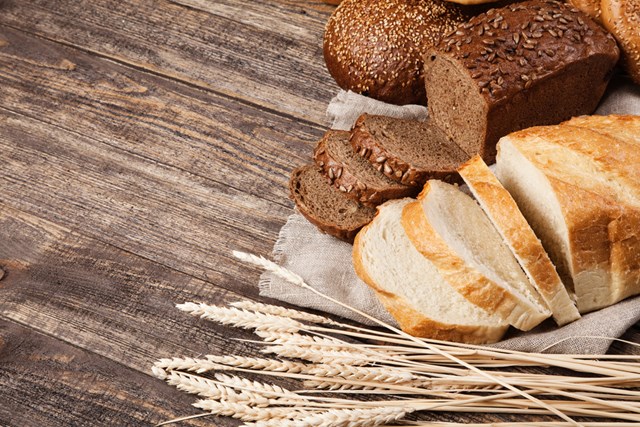
Image via Shutterstock
Whole wheat doesn’t necessarily beat out the bleached alternative.
When it comes to bread, we’ve known for a long time now that it’s better to pick the brown, whole-grain-y stuff over ultra-processed white bread. Right?
Well, maybe not, according to a new study published in Cell Metabolism and reported on by Science Daily. Apparently, we should be focusing less on the bread itself and more on who’s eating it.
Here’s how the study went down: Researchers at the Weizmann Institute conducted a randomized trial with 20 healthy subjects in order to figure out how processed white bread and “artisanal whole wheat sourdough” might affect the human body in different ways. Half of the participants were asked to eat more white bread for one week than they normally did, and the other half was assigned to eat more whole wheat sourdough. Then, there was a controlled 2-week period with no bread, after which time the two groups swapped diets. The half that had originally consumed the white bread switched over to whole wheat, and vice versa.
Before, during, and after the study, the researchers monitored health effects including glucose levels, calcium, iron, and magnesium levels, cholesterol numbers, kidney and liver enzymes, and more. They even kept an eye on participants’ microbiomes as well as inflammation and tissue damage.
Their conclusion? Depending on the subject, white or whole-wheat bread-eating could yield a different reaction—sometimes adverse, sometimes not. The findings were varied enough that the researchers predicted that some participants had more intense glycemic responses than other participants, depending on which type of bread they were eating. Around half of the group was found to have a “better” response to the processed white bread, while the other had a “better” response to the whole wheat sourdough.
"The initial finding, and this was very much contrary to our expectation, was that there were no clinically significant differences between the effects of these two types of bread on any of the parameters that we measured," Eran Segal, a computational biologist at the Weizmann Institute of Science and one of the study's senior authors, told Science Daily. "We looked at a number of markers, and there was no measurable difference in the effect that this type of dietary intervention had."
Meanwhile, Eran Elinav, a researcher in the Department of Immunology at the Weizmann Institute who also helped author the study, explained why these particular findings could be so significant.
"The findings for this study are not only fascinating but potentially very important, because they point toward a new paradigm: different people react differently, even to the same foods," he said. "To date, the nutritional values assigned to food have been based on minimal science, and one-size-fits-all diets have failed miserably.”
As he reiterated, “These findings could lead to a more rational approach for telling people which foods are a better fit for them, based on their microbiomes."
Of course, as yet another author of the study pointed out, the findings should be taken with a grain of salt.
